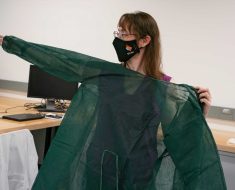Alzheimers Research UK explain 'what is dementia?'
Age and genes are risk factors for dementia that are difficult or impossible to change.
But research has previously shown 40 percent of dementia cases could be prevented or delayed by targeting modifiable risk factors throughout life.
Giving your brain a regular workout is one of the ways to potentially stave off the condition, and a new book hopes to achieve just that.
Mind Games by Alzheimer’s Society Head of Knowledge and Learning, Dr Tim Beanland, is now on sale, Wales Online reports.
He said: “One in three people born in the UK today will go on to develop dementia and it’s the UK’s biggest killer. There’s growing evidence that an active lifestyle is closely linked to healthy ageing, in both body and mind.
READ MORE ‘Distressing’ dementia symptom that could emerge on Bonfire Night

“A good way to keep your brain healthy is to be mentally active throughout life, perhaps by learning another language or a musical instrument, or by writing, making art or doing puzzles.
“Central to this idea of cognitive stimulation is that it should challenge you, which often means trying new things: variety is the spice of brain health.
“My puzzle book, Mind Games, is a useful resource for anyone keen to improve brain health and enhance mental agility. And importantly, it’s a fun way to give the brain a good workout. Use it or lose it!”
Dementia is a term used to describe the impaired ability to remember, think, or make decisions that interfere with doing everyday activities, and there are different types – Alzheimer’s being the most common.
Don’t miss…
Red flag sign of vascular dementia could be linked to your ears, warns expert[EXPERT ADVICE ]
‘I’m a dementia expert – here’s an early sign that can appear when you read'[INSIGHT]
New study suggests popular breakfast foods could lower your risk of dementia[STUDY]

- Advert-free experience without interruptions.
- Rocket-fast speedy loading pages.
- Exclusive & Unlimited access to all our content.

‘Cognitive reserve’ is a person’s ability to cope with these diseases and is built up by keeping the brain active over a person’s lifetime.
The more cognitive reserve a person has, the longer it takes for any diseases in their brain to cause problems with everyday tasks.
Puzzles may help build up cognitive reserve, improve brain function and prevent age-related cognitive decline.
Dr Beanland’s new book features 150 puzzles of varying difficulty, including puzzles to challenge memory or skills with pictures, words, numbers and logic.
Dr Beanland also provides insight into the science of brain health and the benefits of regular mental exercise.
Also included is a seven-day puzzle programme, as well as practical tips and advice to keep your mind active and engaged.
Alzheimer’s Society said the book is the ultimate resource for anyone keen to improve their brain health and enhance their mental agility.
Mind Games is available to buy on Amazon and in major bookstores, and part of the proceeds will go towards Alzheimer’s Society.
Source: Read Full Article





